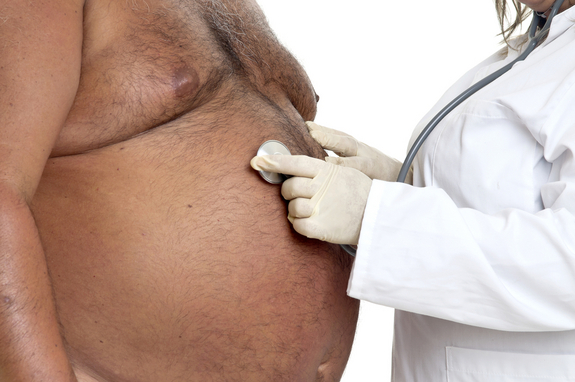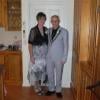It Lurks Where You Least Expect It

Obesity bias. We all hear about, and some of us experience it, in the workplace and in social situations. But obesity bias lurks elsewhere, in places where you’d least expect it because the people involved are so well-educated. It lurks in what I call the “helping professions”. Teachers, ministers, people who ought to know better. Because of that, I addressed the last chapter of Bandwagon to medical professionals. Telling them how I feel about obesity bias is important to me personally, and awareness of the issue is important to us all, fat or thin, young or old. Politicians, educators, and the media can help (if they can just get their heads screwed on straight), but those of us who suffer from obesity can help by refusing to tolerate it. That’s why I’m reprinting my obesity bias chapter here: I want to put the fire in your belly. Curious? Read on.
AN OPEN LETTER TO MEDICAL PROFESSIONALS
You wouldn’t guess it to look at me now, but I was once obese enough to qualify for and have bariatric surgery. I was so fat that I got stuck in turnstiles, had to use handicapped stalls in public restrooms, and dressed in drab garments that looked like they were made by Omar the Tentmaker. I was so fat that children would point at me and giggle. So fat that I couldn’t fit in a booth in nice restaurants. So fat that fellow airline passengers groaned when I sat down in the seat beside them.
Despite all that, I think I've been pretty lucky. I haven't suffered as much of the obesity prejudice that others like me have faced. My career might have been more successful if I was thin, but I was never aware of obesity bias in a workplace and I advanced further in my career than I ever could have dreamed possible. But I have experienced obesity prejudice, and some of that has come from you: the health care professionals with whom I've entrusted my physical and mental health, and that's a special kind of betrayal.
I’m not a doctor; nurse; nutritionist; dietician; surgeon; exercise physiologist; physical or occupational therapist; medical, laboratory, radiology or surgical technician; or psychiatrist, psychologist or social worker, so I can only make assumptions about what motivates you in the practice of your profession. It’s probably a mix of things: the need for a paycheck; love of science; the expectations of your families, teachers and employers; laws and ethics (both written and unwritten); the desire to relieve suffering; and compassion for your patients.
In reality, compassion seems to be undervalued in both the medical community and society at large. I'm told that medical students undergo training so grueling that it would be considered inhumane in any other environment. Then they leap into a practice that requires them to balance patient care with business, financial, insurance, legal and ethical issues that their formal education did not fully address (if at all).
Americans of any profession live in a paradoxical society. We praise the athlete who finishes out a game despite a serious injury while we pop pain pills for the aches in our own inactive bodies. We give our children television sets, video games, cell phones and junk food, but don't have time to play with them or encourage them to exercise. Our government mandates the publication of nutrition information on food packages that we are unable or unwilling to understand. We admire the underweight women pictured in celebrity magazines while we wait in line at the supermarket to purchase a cartful of super-processed, calorie-rich, nutrition-poor food. During our daily trip to McDonald's, we recoil when we see an obese person enjoying the same meal that's on our own tray. We think, "What a pig! I would never let myself get that fat. Why doesn't she go on a diet? She must be too lazy or too stupid." Then we stuff another fistful of French fries in our mouths, take a big swig of Coke, and secretly loosen the button on our own straining waistband. The meal we have just eaten could feed a third-world family for a week, but neither our greediness nor their neediness concerns us. Somehow the careless eating habits of a normal weight person, the anorexic eating of an underweight actress, and the starvation of an impoverished child are all okay, but the overeating of an obese person is reviled.
Despite the societal stigma associated with it, obesity isn't the shameful plight of "other" people — lazy, unlucky, immoral people. It can happen to anyone. It happened to me, and it can happen even to well-educated medical professionals like you.
I am by no means lazy. God has given me many blessings, and I do my best to live in a moral fashion, but through a mysterious combination of nature and nurture, I suffer from the chronic disease of obesity. It is no easier for me to cure myself of this disease than it is for someone to cure herself of asthma, epilepsy or diabetes. I find it ironic that the only current "cure" for diabetes - gastric bypass surgery - is so often considered to be unnecessary “cosmetic” surgery when an obese person seeks it as treatment for their disease.
When I asked him for a referral to a bariatric surgeon, the physician who diagnosed my Type 2 diabetes (who happens to be morbidly obese himself) told me, "You don't need something that drastic. You just need to try harder." Telling me that was as helpful as telling a patient with a broken leg, "Let's just wait and see if this gets better on its own. If you concentrate hard enough, that bone will mend itself."
That same doctor told me many times to exercise more and eat less. We live in a small town and I see him and his family in local restaurants and stores, but never at the health club owned by the hospital with which he is affiliated. The most strenuous exercise I've seen him do is to repeatedly lift a fork to his face as he plows through a plate of Mexican food.
Do I sound bitter? I suppose I am, and you would be too if you had been treated by your fellow human beings, including medical professionals, the way I have been treated. To hear me talk, you might think I'm nursing a grudge against my doc, but I'm not. My obese doctor is a really nice guy, and I have genuine respect for the talented, hard-working people who practice the "helping professions". But not for one minute do I believe that any of them are qualified to judge me. That privilege is reserved for God.
Sometimes it's the most kind and well-intentioned people who inflict the most hurt and humiliation on an obese person. To suffer that at the hands of professionals who ought to know better has been especially hurtful and disappointing.
When I first moved to Tennessee, I went to see Dr. X, the family physician recommended to me by a local friend. He gave me a prescription for my high cholesterol (essential, he said), refused me medication for depression (not necessary, he claimed), and told me I must lose weight (also essential). I asked him how I should do that. His response was, "It's simple. Put the fork down. Eat less and exercise more." When I said, "That's easier said than done," he answered, "You don't need to talk about it. Just do it." (He also inexplicably refused to give me a referral to a nutritionist, psychotherapist or weight loss support group.) From this experience I could only conclude that my obesity was due to a fatal lack of willpower.
I reported that conversation to my friend, who said, "That's probably because Dr. X used to be very heavy himself, and he thinks if he can lose weight, anybody can." The fascinating thing about that factoid was that although Dr. X was specially equipped by his own experience with obesity to give advice, support, and compassion to an obese patient, he was unable or unwilling to offer me any of those things. I don't know what his problem was, because I never got to know him better. I found another family doctor (the obese one) and never returned to Dr. X for medical care.
I've also experienced obesity prejudice in a mental health setting. For a year or so I attended a support group meeting for behavioral health patients at our local hospital. The woman who facilitated the group was an addiction specialist - entirely appropriate considering the high proportion of drug and alcohol addicts in the group, but even she laughed when I told the group, "It's all very well for you to talk about abstinence. You can completely give up drugs or alcohol and survive just fine, but if I completely give up food, I'll die." I'll admit I often say funny things with a serious expression on my face, but how was that statement funny when tears were running down my face?
I've even experienced a subtle form of obesity prejudice in a bariatric medical practice. In the past five years, I've used the services of two different hospitals with well-established, well-respected bariatric surgery programs. I won't name them because medically I have no bone to pick with them, but I will describe them because they reveal a lot about themselves in their bariatric facilities' design.
One facility is supplied with plus-size patient gowns; wide benches and chairs; wide hallways and doorways; big exam tables with sturdy step stools beside them; large, easy-access restrooms; specially-equipped operating rooms; large-size blood-pressure cuffs; and many other accommodations for large-sized patients. The other facility has none of that, and if a patient is too large to fit through the door that leads to the exam rooms, his or her consult may take place in the waiting room, in the sight and hearing of other patients. So much for patient confidentiality, huh?
Both of these facilities have given me excellent and considerate care, but only one of them gives the impression of having thought deeply about what its patients really need.
And speaking of what bariatric patients really need, I also have a word for the general surgeons who are jumping onto the bariatric bandwagon in hopes of increasing revenue: please, please don't lift that scalpel until you've established a complete patient education and aftercare program, employing the services of the experienced nurses, nutritionists, psychologists, exercise physiologists and other bariatric professionals who can make or break your patients' success.
When you have your team assembled, please make sure they're all singing from the same sheet of music. One of the most common complaints I hear is that staff members in a single bariatric practice issue conflicting instructions - for example, the surgeon says you should eat 1/2 cup of food per meal, but the nutritionist says you should eat 1 cup. My response to this is always: follow the surgeon's advice until you're able to clarify the issue. But bariatric surgery patients, especially new ones who are trying to learn dozens of new facts and behaviors, do not need their bariatric team adding to their confusion.
Just as you should not underestimate your patients' need for education and support, nor should you underestimate their intelligence. Surely as a scientist you can acknowledge that human intelligence is not inversely proportionate to body size, any more than it's related to skin color, ethnicity or religious belief, but I must remind you that mental faculties do not decrease as body size increases.
While I appreciate any efforts you make to communicate clearly, it is not necessary to talk down to me. And baby talk is out of the question. I will never forget the doctor (about 15 years my junior) who explained to me that while I (age 50) was catheterized for surgery, I would "go pee pee" into a bag. I am not a child, and I will thank you to treat me as an adult. If you want me to call you "Doctor Smith", please address me as "Ms. McMillan" (or, if you are of a southern persuasion, "Miss Jean").
By now you may be thinking, "I don't have time for any more of this nit-picking," or, as a nurse practitioner once said to me, "I don't have any more time for you today. I have sick people to see." But before you run off, I also want to say this:
Thank you for all that you do, for your arduous studies, hard work, and long hours; for the risks you take, your research, your continuing education; for being willing to treat a complicated and chronic disease like obesity with an expensive medical gadget that's being refined and improved even as I write this, even as you walk through the operating room doors to perform weight loss surgery on another patient. Keep up the good work, partner. None of us would get very far on the bariatric bandwagon without you!
thank you for putting in to words again, how people need to open their eyes to weight loss and obesity, I hate the word morbid, makes me feel like I should be in a black gown the bottom dragging.. with white face paint on, looking like death. or so fat that there's a string tied to my foot because Im so round and fat I'm floating like a balloon. We didn't chose to be heavy. It happened. While I never got stuck in anything, being only 5 feet tall, the extra weight I carried did make me look round. The extra weight was not heathy. You can excercise did you drop, eat lightly but without the proper guidance that we need we are going in circles. I've been lucky to have the same m.d since I was 24. He knows my hypochondriacic ways, and knows what I need to hear. I will be alright, I will be healthy again, and sometimes just hearing it makes a world of difference. I don't need to have my hand held, I just need to have you point me in the right direction. The one thing I do remember, is going in for a cat-scan and the nurse handed me 2 gowns , saying oh you might need this. I didn't but I still put it on.. I can tell too when someone is making a comment about (or was) you feel their looks, the sense of shame and quick tears we try to hide , laugh it off, we don't hurt any less than anyone else. There's no need to defend ourselves to these people, I tell myself Karma baby karma) and go on my way.
good luck to all
excellent article - a great read and so, so true.
I started thin, got obese for 20 years, and am back to being thin. I am a highly educated professional and because i was/is so good at my job (and maybe because i work with extraordinary people) i do not believe i have suffered discrimination at my job. But the rest of the world is a different story and being on both sides of the equation i feel especially qualified to speak about the true discrimination that lingers. You just did it for me though ha! Great article.
There is another layer of this problem that I can attest to and that is the bias among medical professionals and their obese colleagues. I am a morbidly obese nurse practitioner. People make appointments with me and I am paid a nice salary to help others lose weight, control diabetes, high blood pressure, high cholesterol, and sleep apnea, yet I have all of the above problems. I cannot imagine what people think when I open the exam room door. Sometimes I think I try to compensate by being the best provider I can be and "force" people to see me for my education and experience, not for who they see on the outside. What keeps me going is the countless less-than-perfect-bodied people who come to me because the skinny doctor just doesn't understand. Obese patients need an extra level of compassion, especially when it comes to women' s health. I'm not sure a skinny doctor with all the degress in the world could truly grasp this. You would be surprised how many women forgo pap testing because of the thought of getting in those stirrups at 300 pounds. I make a point to convince these women to give me chance to make it a positive and easy experience for them-- cause I know just how you feel.
Mrspopeye, it's funny because I tend to assume that an obese medical professional knows exactly how hard it is for me to manage my weight and is less likely to judge me, so I'm less likely to judge them. That's why I was disappointed that my formerly-fat doctor coudn't empathize with me. But maybe the sight of obese people reminds him too much of where he used to be.
Great article and very timely. There has just been a study released in Australia which discovered that obese women are discriminated against. Doh! they needed to do an academic study to figure that out? I know I was invisible in clothing stores at 149kg but the 65 - 70 kg woman could be served in an instant. I know I am treated differently in the work place since losing weight. I know I am treated differently by healthcare professionals. I know when people are looking, pointing, sniggering, judging, talking about me.
I lost count of the number of times that doctors told me to lose weight but didn't offer any advice, help or program to assist me. But none of them said, "You need antibiotics" and then pushed me out the door to figure out which ones, what dose and to source them for myself!
Whew! Thank you for putting it all into black & white for us! I am so glad I found a great surgeon (I'm in Tennessee also), and he has a wonderful staff. However, I have experienced a lot of the same things from prior doctors. In fact, my general practitioner would change the subject everytime I mentioned possibly having LAP-band surgery. I finally took the matter into my own hands and made appointments and got information, until all he had to do was write a letter to my surgeon and the insurance company. I think at that point, he finally realized I was serious. Again, thanks for writing this.
I lost count of the number of times that doctors told me to lose weight but didn't offer any advice, help or program to assist me. But none of them said, "You need antibiotics" and then pushed me out the door to figure out which ones, what dose and to source them for myself!
Well said!
This is very good.
I'd add this: Don't be lazy and assume that every health-related problem I have must be attributable to my obesity.
I had a painful repeated miscarriage history that I was told was because I was obese. It motivated me to have surgery, which I have been successful with, so there was a blessing there. But ultimately, my miscarriages had nothing to do with being fat and couldn't be treated with lapband surgery-- something my doctor would have known through looking more carefully at my genetic tests rather than just assuming it could be laid at the feet of my weight.


.thumb.jpeg.4739d5a5455c1d2801c0b9c0c03c6131.jpeg)






ready4animprovedme 54
Posted
I really enjoyed reading this. So much of what you say holds a lot of truth. If I had a dollar for every time I was discriminated against I'd have a million + dollars. In my 23 years of existence I've been ridiculed, judge, laughed at, whispered about, and stared at by almost every stranger I've encountered. Whether it be at the grocery store where a child looked to his mother and said "she's fat" or at a restaurant where the guy running the register points at you while whispering to his co-workers... someone asked "how do you know they were talking about you"?... without ever hearing it with your ears, with your eyes you can see the disgust and the instant judgement being placed on you. I have yet to receive my surgery but I can only imagine how differently everyone around you treats you... sad really
Share this comment
Link to comment
Share on other sites